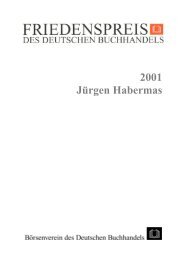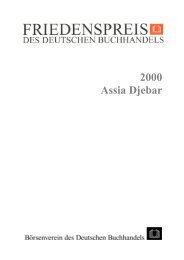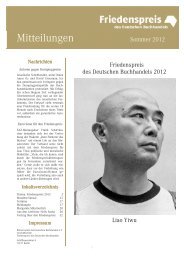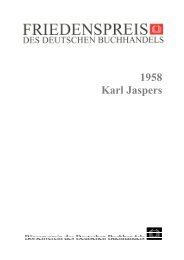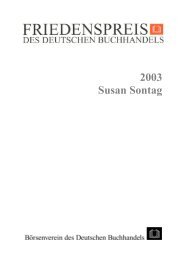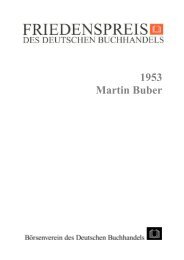2011 Peace Prize speeches - Friedenspreis des Deutschen ...
2011 Peace Prize speeches - Friedenspreis des Deutschen ...
2011 Peace Prize speeches - Friedenspreis des Deutschen ...
Create successful ePaper yourself
Turn your PDF publications into a flip-book with our unique Google optimized e-Paper software.
and the French, but at independence, when the<br />
moment came to rally the people, including those<br />
most recently arrived, the Pieds-Noirs, to<br />
marshal their talents and move forward, it erased<br />
its memory at a stroke; in an inexplicable<br />
autoodi, an act of self-hatred, it renounced its<br />
ancestral Berber and Judeo-Berber identity and<br />
everything it had learned over thousands of<br />
years of history and retreated into a narrow history<br />
which owed much to mythology and very<br />
little to reality. The reason for this?<br />
It is the logic of totalitarianism, the Unity<br />
Party system wanted Their religion, Their history,<br />
Their language, Their heroes, Their legends,<br />
concepts dreamed up by a select group and imposed<br />
by decree, and propaganda and threats<br />
guaranteed the condition necessary for these<br />
stillborn fables to work: a terrified populace. The<br />
struggle for the recognition of our identity was<br />
long and painful, repression resulted in the<br />
deaths of hundreds of activists, especially in<br />
Kabylie, a region that has always been indomitable,<br />
torture and imprisonment broke thousands<br />
of people and drove whole populations into exile.<br />
True to its own logic, repression was extended to<br />
French-speakers, Christians, Jews, the laity, to<br />
intellectuals, to homosexuals, to free women, to<br />
artists, to foreigners, anyone, in fact, whose very<br />
presence might threaten this illusory identity.<br />
The sweeping pageant of human diversity became<br />
a crime, an insult to identity. The struggle is<br />
not over, the har<strong>des</strong>t part still lies ahead, we<br />
must free ourselves and rebuild ourselves as an<br />
open, welcoming democratic state which has a<br />
place for everyone and imposes nothing on anyone.<br />
You know all this, Ladies and Gentlemen,<br />
and you know that it is this violence, this endless<br />
persecution, this appalling interference in<br />
our private lives that led to the rebellions in our<br />
countries which have erupted, one after another,<br />
like fireworks. These events have brought many<br />
tragedies but we accept them because at the end<br />
of the road there is freedom.<br />
For having written these things which<br />
everyone knows, my books are banned in my<br />
country. This is the absurdity dictatorship feeds<br />
on: my books are banned but I, who wrote them,<br />
still live in the country and am free – at least<br />
until further notice – to come and go. If a sword<br />
of Damocles hangs over my head, I do not see it.<br />
<strong>Peace</strong> <strong>Prize</strong> of the German Book Trade <strong>2011</strong><br />
12<br />
And if my books still circulate in Algeria, it is<br />
thanks to the invisible and highly dangerous<br />
work of a number of booksellers. In a letter<br />
addressed to my compatriots, published in 2006<br />
under the title Poste Restante: Alger, I wrote the<br />
following: “But for the fear of pushing them to<br />
breaking-point (I am talking about the intolerant),<br />
I would tell them I did not write as an Algerian,<br />
a Muslim, a nationalist, proud and easilyoffended,<br />
had I done so I would have known<br />
exactly what to write how to be discreet, instead<br />
I wrote as a human being, a child of the earth<br />
and of solitude, distraught and <strong>des</strong>titute, who<br />
does not know what Truth is or where it lives,<br />
who owns it, who apportions it. I seek it out and,<br />
truth be told, I seek nothing, I do not have the<br />
means, I tell stories, simple stories about simple<br />
people whom misfortune has pitted against seven-armed<br />
thugs who think themselves the centre<br />
of the universe, like those who loom over us,<br />
grinning crudely, those who seized our lives and<br />
our possessions and who, in addition, now demand<br />
our love and our gratitude. I would like to<br />
tell them that the bureaucratic, sanctimonious<br />
police state they support by their actions troubles<br />
me less than the embargo on thought. Granted<br />
I am in prison, but my mind is free to roam,<br />
this is what I write about of my books, and there<br />
is nothing shocking or subversive about it.”<br />
In The Rebel, Camus says: “To write is already<br />
to choose.” And that is what I did, I chose<br />
to write. And I was right to do so, the dictators<br />
are falling like flies.<br />
With your permission I would like to conclude<br />
with a few thoughts concerning the Arab<br />
rebellions and the Israeli-Palestinian conflict.<br />
Since the Jasmine Revolution in Tunisia we all<br />
feel it: the world is changing. What in the old,<br />
sclerotic, complicated, doom-laden Arab world<br />
seemed impossible has happened: people are<br />
fighting for freedom, committing themselves to<br />
democracy, throwing open doors and windows,<br />
they are looking to the future and they want that<br />
future to be pleasant, to be simply human. What<br />
is happening, in my opinion, is not simply the<br />
overthrow of ageing, deaf, dull-witted dictators,<br />
nor is it limited to Arab countries, it is the beginning<br />
of a worldwide change, a Copernican<br />
revolution: people want true, universal democracy<br />
without barriers or taboos. All that <strong>des</strong>-<br />
*





